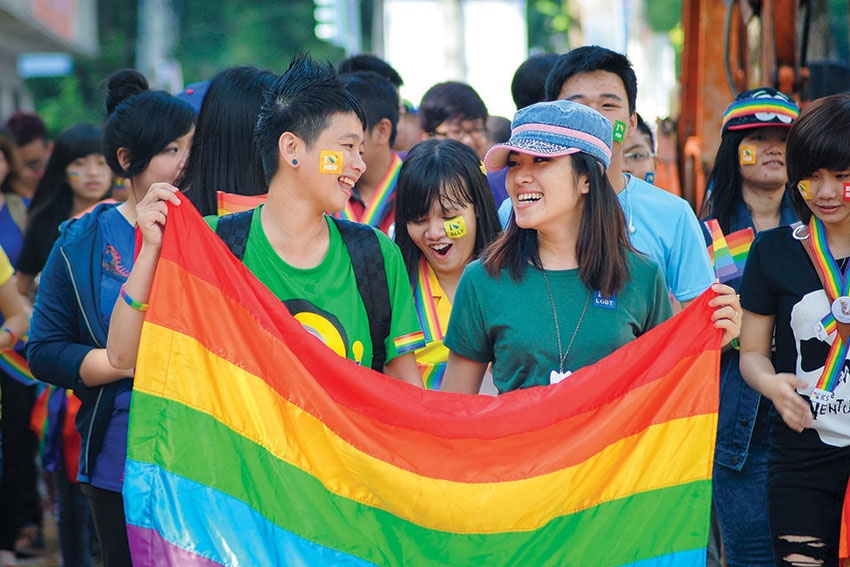Vietnamese LGBTI+ people paint their own identities
At Miss Universe Vietnam 2022, Do Nhat Ha became the first transgender contestant ever to enter the final round. She was also the winner of Miss International Queen Vietnam 2019 and represented the country at the event's worldwide equivalent, the biggest international beauty pageant for transgenders. This is deemed to demonstrate the significant efforts made by members of the LGBTI+ community to express their self-confidence and integrate into society.
 |
| Vietnamese LGBTI+ people paint their own identities |
In Vietnam, common estimates state that LGBTI+ people account for roughly 5-11 per cent of the total population. Individuals of the community are also increasingly recognised as equal and regular members of society, according to a report conducted by the Institute for Studies of Society, Economy, and Environment (iSEE) alongside the Vietnam Centre for Economic and Strategic Studies.
Bui Long Phuc, account executive at multinational marketing and advertising agency Dentsu Vietnam told VIR, “In the past, I participated in the ‘Coming out Vietnam’ project to encourage people to reveal their true nature. When I joined Dentsu, management inquired extensively about the project and the subsequent experiences I acquired, which I could then apply to my future job. They were interested in learning about the project's history and its impact.”
He added that the firm fosters an inclusive workplace by promoting learning about the LGBTI+ community. In addition, employees are required to complete training programmes on diversity and inclusion in the workplace, as well as a policy against discrimination.
Currently, numerous members of the LGBTI+ community in Vietnam openly disclose their gender identity and sexual orientation without fear of stigmatisation or prejudice, according to iSEE. In addition, they have the opportunity to establish themselves at school, in work, and in all areas of life.
One of those areas is entertainment, in which drag queen shows are popular worldwide as well as in Vietnam. Gia Ky, considered by some to be a pioneer in the art of drag in this country, explained that the origin of drag is precisely self-expression, and not femininity. On stage, drag queens can present themselves in all forms.
"The success of a drag queen lies in the audience’s enjoyment of the beauty, not in the transformation into a woman," Ky said. “Being a drag queen is the legacy I seek to establish in life. Future generations will recognise Gia Ky while discussing the history of drag queens in Vietnam. This describes my desired existence.”
In an increasingly interconnected world, the LGBTI+ community in Vietnam has more options to express themselves, particularly in terms of spreading inspiring messages to everyone.
Couple Minh and Thanh went viral earlier this year on video-sharing platform TikTok by publicising their romantic relationship and openly living true to themselves.
They met through a dating app for gay people and quickly discovered self-image and harmony in one another, and have also been fortunate enough to receive the support and blessing of family and friends.
In a video clip uploaded to their TikTok channel, Thanh was amazed by his father's reaction when he revealed Minh was his partner. He is aware of his son being a homosexual, yet has always supported and encouraged him to be himself.
Thanh said, “I first made a TikTok channel to save our daily moments and did not anticipate so much support. However, there are other people who offer strong criticism and discriminate due to their prejudices and misunderstanding of LGBTI+. We wish to somewhat change their perceptions.”
Grete Lochen, Ambassador of Norway to Vietnam said, “Vietnam has a youthful, diverse, and proud LGBTI+ community with increasing acceptance from society. Being a lesbian myself, I have personally experienced this advancement very clearly. The country can serve as an example of inclusiveness for other nations in the area, albeit considerable work remains.”
Vietnam has implemented some legislative protections for the LGBTI+ population. In 2014, the new Marriage and Family Law lifted the restriction on same-sex marriage; while Article 37 of the 2015 Civil Code, which went into effect in 2017, permits gender reassignment surgery.
What the stars mean:
★ Poor ★ ★ Promising ★★★ Good ★★★★ Very good ★★★★★ Exceptional
 Tag:
Tag:
Themes: Empowering Women
- Female influence still to be attained
- Shaping Vietnam's corporate future: female board members show business excellence
- Nestlé Vietnam contributes to elevating the role of women across the supply chain
- Empowering female leaders in tech: insights and aspirations shared at KPMG Tech Innovator 2023
- Brighter Path programme hosts empowerment meeting for ethnic minority girls
Related Contents
Latest News
More News
- Dong Ho folk painting added to UNESCO’s urgent safeguarding list (December 11, 2025 | 18:09)
- Conference focuses on switch from dog and cat meat trade to sustainable, safe jobs (December 11, 2025 | 12:13)
- 3F Plus clean pork amazes Michelin-starred chefs (December 09, 2025 | 12:15)
- The Rhythm of Blues – Colours of the Year 2026 (December 06, 2025 | 12:10)
- Pan Pacific Hanoi kicks off 2026 art awards celebrating young and disabled artists (November 06, 2025 | 18:25)
- PREP AI Language Fair 2025 highlights AI-powered language learning (November 03, 2025 | 09:00)
- Hanoi strengthens rabies control and supports transition of dog and cat meat trade (October 28, 2025 | 18:09)
- World-famous Gaia Earth installation touches down at UNIS Hanoi (October 07, 2025 | 13:40)
- Sidecar passion drives Vietnamese motor enthusiasts wild (September 05, 2025 | 09:00)
- Sheraton Saigon unveils artistic mooncake collection for 2025 (August 08, 2025 | 09:00)


















 Mobile Version
Mobile Version